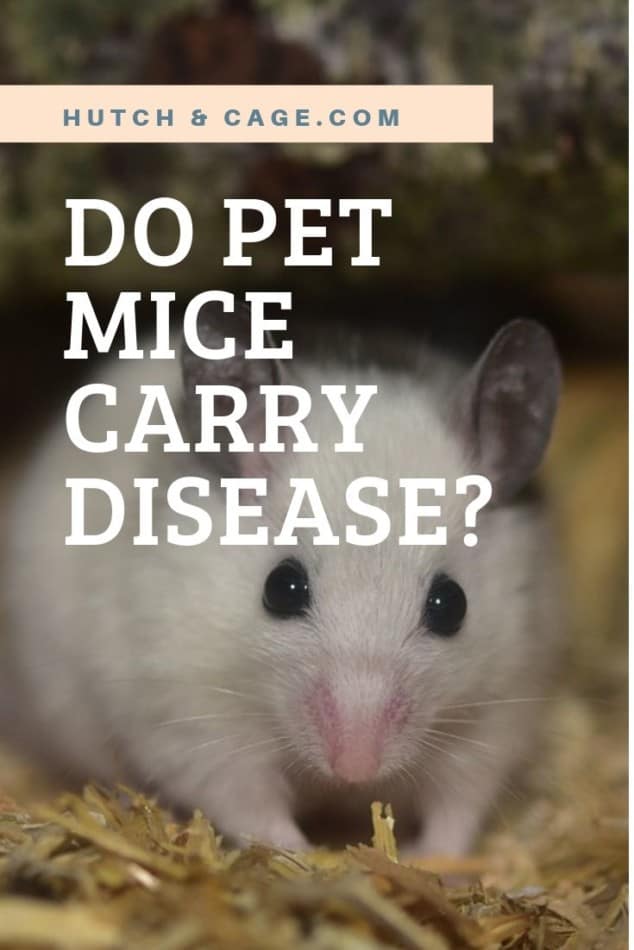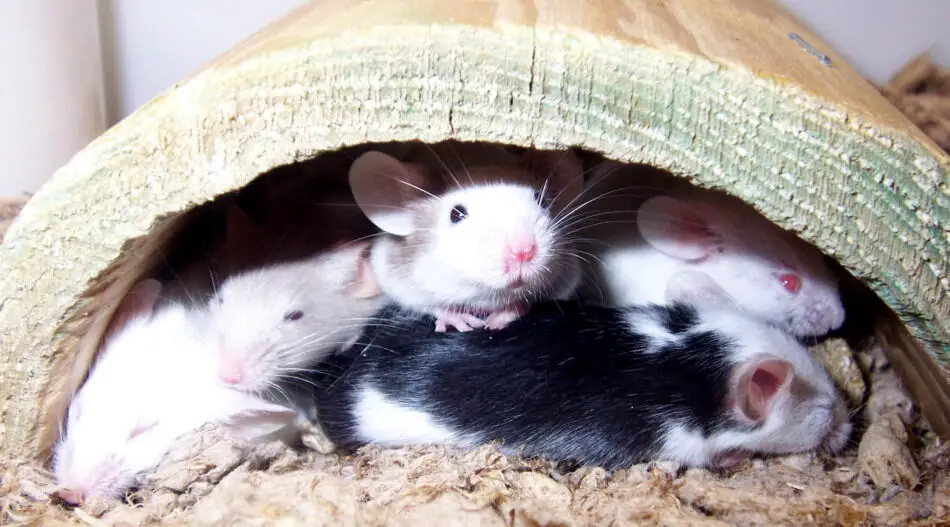Mice make exceptional pets, especially for those families who may be limited in space.
They are cute, friendly, tiny bundles of fun which will give you hours and hours of enjoyment.
This includes watching them scurrying around their cage and petting them whilst taking them out for exercise.
But, how careful should you be whilst handling your mice? Do they carry diseases and can you catch them?

Pet mice can carry diseases and you can catch them too. However, ‘can’, is the important word here as diseases are rare, with human infection being even rarer. You should, nonetheless, be aware of all these diseases, and how best to avoid them.
Table of Contents
Potential Mouse/Human Diseases
Rat Bite Fever
Rat Bit Fever is a disease, and as the name suggests, is usually associated with rats.
However, there is also a possibility that your mouse friend could also be carrying it.
Usually contracted by your mouse biting you, it can also be passed by simple contact.
Symptoms and sickness may take up to three weeks after infection to show themselves. Rat Bite Fever starts with a fever and a rash possibly appearing on your hands and feet after a couple of days.
Treatment is by antibiotics, which are vital. Left untreated Rat Bite Fever can be scary and possibly fatal.
LCMV
LCMV stands for lymphocytic choriomeningitis virus. Handling dirty bedding or being bitten by a pet mouse is usually the way LCMV is transferred to humans.
Symptoms include fever, achy muscles, stiff neck, headache, vomiting, and decreased appetite. It is, in fact, very similar to having the flu.
Not everyone who is exposed to LCMV will get sick, but if you are, the disease will take up to two weeks after exposure to show.
Keeping your mouse cage sparkling clean and washing your hands after handling them will help prevent the contraction of this disease.
However, pregnant women should avoid holding or cleaning their mouse cage during pregnancy.
Salmonella
This may sound crazy as salmonella comes from raw chicken and eggs right?
Well, yes it does but it can also be harbored by your pet mouse. As a result of contracting Salmonella, intestinal upset and diarrhea are suffered by humans.
The disease can also be spread through your mouse’s poop. The mouse itself may not show any symptoms of this disease.

Leptospirosis
In humans, leptospirosis can cause fever, headaches, achy muscles, red eyes, a rash, yellow skin, stomach pain, and diarrhea.
It has two stages, the first being a flu-like illness which you will seem to recover from.
The development of Wiel’s disease follows which is a far more dangerous situation.
Kidney and liver failure plus meningitis can be the end result of leptospirosis if left untreated.
Monkeypox
It first needs to be said that monkeypox is incredibly rare, with very few recorded cases from mice.
However, since it is a disease that pet mice can carry, and which humans can catch, it has made it onto this list. Monkeypox, as the name implies, is a disease carried by monkeys.
Other animals such as rabbits, rats, and mice can also carry the virus.
It got its name due to its first being discovered in laboratory monkeys in 1958. You can contract this disease if bitten by a mouse or touching its bodily fluids or blood.
Monkeypox will pass from human to human. Coughing and sneezing produce respiratory droplets. It is these droplets that create the pathway for spreading the disease.
There is no known treatment.

How To Ensure You Avoid Catching Diseases From Mice?
As rare as the possibility of you catching a disease from your mouse may be, it is still advisable that you follow these handy tips:
- Avoid mice as pets for children under five, pregnant women, or people with weakened immune systems.
- Don’t smoke, drink, or eat whilst playing with or providing care for your mouse.
- Keep your mouse and its supplies out of the kitchen and away from areas where you are preparing, serving and eating food.
- Always wash your hands after feeding, touching, and caring for your mice or their cage.
- Watch out for unusual smells coming from their cage.
- Do not kiss, nuzzle, or hold your mice near your face. Not only can this increase the chances of infection but it may also startle your mouse into biting.
- Be sure to clean and disinfect the areas where you have cleaned your mouse’s cage. Avoid using the kitchen sink or food preparation areas to clean them. Rather, have a bowl that is specifically for your mouse maintenance.
- You should also bear in mind that pet mice can shed germs that will contaminate areas in which they roam and live. There is no touch necessary to get sick from these germs. For this reason, you should always ensure your mouse is properly secure in their enclosure. This will stop them from roaming and spreading germs in areas that they should not be.
- If you suspect your mouse may be sick, you should take them to see a vet. They will be able to diagnose the problem and provide any necessary care and medications.
- If you suspect you may be sick with a mouse-related illness you should seek medical attention from your doctor. This is especially true should you have been bitten or scratched by your mice.
Conclusion: Do pet mice carry disease?
No doubt, the idea that your mouse could be carrying, and even worse, spreading disease to yourself is pretty scary and not appealing in the slightest.
However, the chances of either of these occurrences actually happening are extremely rare.
The majority of pet mice are extremely clean and subsequently disease free and you shouldn’t be put off keeping a furry little friend.




